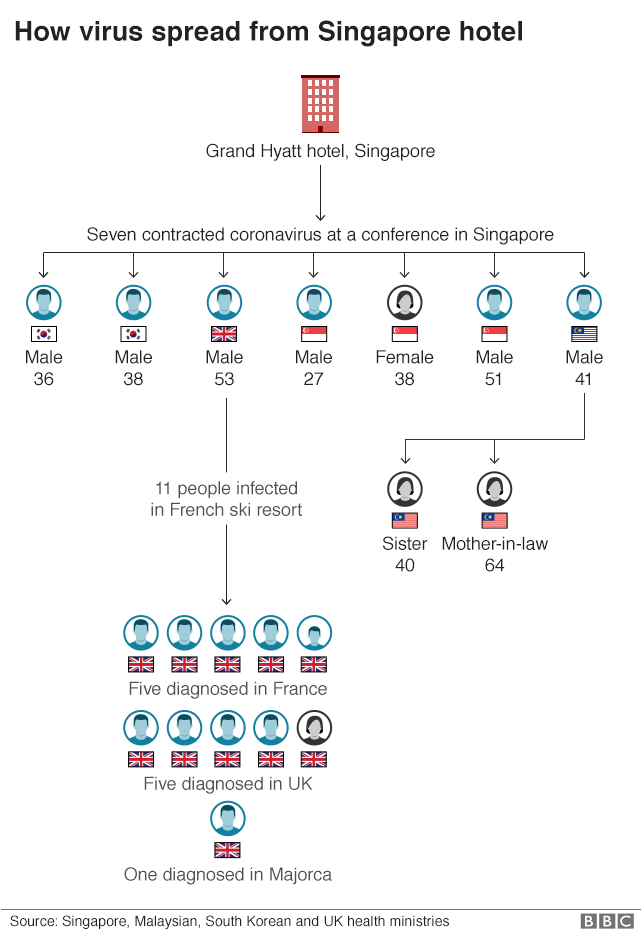Steps Singapore is taking
At home, Singapore is stepping up its coronavirus response by taking extreme measures.
It immediately understood the implications of spread in a densely-populated city. Indeed, eight of the 50 cases reported so far have no known links to clusters that had been in contact with Chinese travellers from Wuhan. That is likely to be of concern because it means the linking cases out there could yet pass on the illness to others.
That's why Singapore has put in place a highly sophisticated contact tracing mechanism to hunt down every known possible contact of those infected so they can be quarantined or monitored.
It was the first country after North Korea and Russia to shut its borders to China and has enforced a strict 14-day leave of absence for Chinese nationals returning from the mainland who are permanent residents or have work permits
It has a zero tolerance approach to any breaches of the measures it has put in - and this is of comfort to many Singaporeans. Employees caught breaking isolation rules saw their work permits revoked and were barred from working in Singapore permanently.
Meanwhile, their employers have been banned from hiring foreigners for two years.
Singapore also distributed masks to more than a million households and has started a government-run WhatsApp group that provides daily updates to subscribers on the number of infected.
It's even cleared out university dorms to make room for quarantined patients, a move that was executed so quickly it took students by surprise.
Panic buying, shortage of masks
But while the measures have been applauded by international health experts, Singaporeans themselves have not always bought the government's messaging.
Social media comments show many Singaporeans don't believe the government's advice to wear masks only when you're unwell, suspecting a shortage of masks instead.
Many also complained Singapore didn't close borders to China soon enough.
And when authorities raised the health alert level last week, indicating the spread of the disease was severe, scores of Singaporeans rushed to the supermarkets to stock up on rice, instant noodles and toilet paper, worried the country was going into lockdown.
The panic abated only when Prime Minister Lee Hsien Loong released a recorded message assuring his citizens there were more than enough supplies.
This level of control is only achievable in Singapore because of its centralised form of decision-making and the massive parliamentary majority the ruling party enjoys.
There are also strict restrictions on what you can say in the public domain about the coronavirus, with the country's anti-fake news law being used to curtail the spread of misinformation.
Lessons from Sars
Still, the main reason Singapore can move fast and quickly to fight the coronavirus is because it's so small, and it is clear that there is a plan in place - one that has been crafted from the harsh lessons of the Sars (severe acute respiratory syndrome) crisis in 2002-2003.
"You would see your colleagues one day at lunch, and then a few days later, you would hear that they are in the ICU, or worse - dead," says Dr Leong Hoe Nam, an infectious diseases specialist.
A Sars survivor, he was on the frontline treating people with the illness in a period that, he says, "scarred and traumatised Singaporeans".
Some 238 people were infected and 33 lost their lives.
"We are such a vulnerable country, so small and well-connected," Dr Leong says.
"You could have a disease one day in China, or anywhere else in the world, and the next minute it could be in Singapore. Containment is actually unrealistic, I don't think China will be able to control it.
"I think a weakened form of the virus will emerge, like a common cold. That will be the eventuality of this virus."
Singapore has no choice but to be extra vigilant and transparent in its fight against this deadly disease. This country is dependent on the rest of the world for its economy, for its food, for its lifeline.
Its strict containment methods managed to stamp out Sars but in the last 10 years Singapore has become more - not less - integrated into the global economy, and more closely tied to China.
The stakes are much higher this time.

